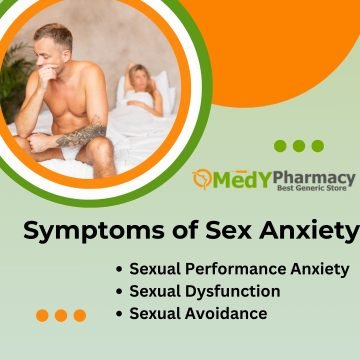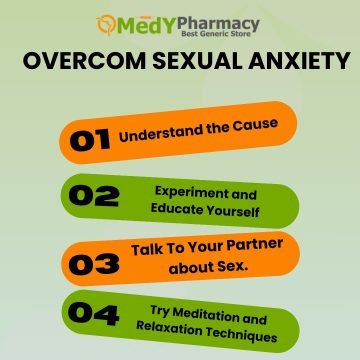Introduction:
Sex anxiety, often known as sexual performance anxiety, affects men and women of all ages, regardless of their level of experience with intercourse.
For some, this form of worry is fleeting and may come shortly after a new sexual encounter.
Other people, on the other hand, may struggle to enjoy a healthy sex life as a result, and they may experience this form of worry on a more frequent basis.
Men and women express it differently, but in most cases, this is tied to the dread that some aspect of their presence between the sheets would disappoint their partner.
And why do we have sexual performance anxiety? The situation becomes a bit more complicated here, but to summarise: we tend to grow nervous about how well we perform in bed or how we appear to our partners, or we may simply be intimidated by the prospect of becoming so intimate with someone.
Below, we provide some advice on how to deal with moments of doubt and fear both before and during sexual encounters, allowing you to live a happier, healthier sex life.
What is Anxiety?
This can be a temporary response to stress or a chronic (long-term) disorder. If you are worried, you may have feelings of fear, unrest, tension, or anxiety. This may influence your behaviour and thinking. Anxious thoughts can last for a long time, leading you to avoid activities you normally love.
What Is Sexual Anxiety?
Also known as sexual performance anxiety, it is defined as “fear, worry, or anxiety associated with sexual activity.” These sentiments might be caused by traumatic events in the past, sexual dysfunctions, stress, or a variety of other circumstances.
This is not uncommon; it is one of the most prevalent sexual problems, affecting up to 25% of men and 16% of women. It can create severe anxiety and may even lead to sexual avoidance.
That being stated, the most important element to consider is the value of communication. Communication can not only make you feel more at ease, but it can also help you pinpoint the source of your sexual anxiety and strive toward a more meaningful sex life.
If left untreated, can lead to additional sexual dysfunctions and a loss of interest in sex and sexual activities. In one study, researchers discovered that this has a significant impact on the development of sexual dysfunction in both men and women.
Frequently feel apprehensive before and during sex
- Are you concerned you won’t reach orgasm?
- Are concerned about sustaining an erection?
- Can’t relax and remain present during sex.
- Feel ashamed or guilty about your sexual performance
How Anxiety Can Obstruct Your Sexual Life
People suffering from sexual anxiety frequently experience negative physical and emotional sensations, such as sexual frustration. This can often lead to negative thoughts before, during, and after sex, causing additional stress or fear. These feelings might become so severe that someone resolves to avoid them, and as a result, they avoid sex entirely.
However, if they are administered anti-anxiety medications to treat symptoms, they may develop sexual anxiety as a result of a reduced sex drive. These medications frequently work brilliantly to alleviate anxiety symptoms, but they frequently have the negative effect of decreasing a person’s sex drive, as well as other potential adverse effects like weight gain.
What’s The Connection Between Performance Anxiety And ED?
This may be linked in numerous ways. Stress and anxiety over sexual performance or pleasing a partner can lead to sexual dysfunction in anyone, regardless of gender.
When a person believes they are unable to match their partner’s sexual expectations, they may begin to feel inadequate or unable.
Feelings of inadequacy and low self-esteem can rise to physical symptoms like ED.
Researchers consider psychological factors to be one of several causes of ED. In other words, a person’s mental state might have an impact on their sexual performance.
Chemicals produced in the body during this process do not contribute to sexual desire. Instead, they dampen it so that a person’s attention can be directed toward the present threat.
People who suffer from anxiety disorders for the rest of their lives are more prone to develop sexual dysfunction.
Additionally, trauma, such as sexual abuse or assault, can cause fear about sexual activity. Chronic discomfort, hormonal changes, and a lack of effective sex education are all possibilities.
Abstinence-only schooling fosters a stigma and guilt about sex that can last into adolescence and adulthood. Sex education that focuses solely on pregnancy overlooks the value of sexual excitement and pleasure. This can lead to people turning to porn for sex education. Can fuel misconceptions about sexual performance and cause anxiety.
Some people may be anxious about sex because they have inaccurate notions of what constitutes healthy sex. That has to do with low self-esteem, what this is like in porn and movies versus in real life, and how much sex they believe they should have.
People mistakenly believe that everyone else has sex all the time and that no one else has issues but them.
Symptoms of Sex Anxiety
People suffering from sexual anxiety may have intrusive thoughts or anxieties, as well as bodily symptoms such as gastrointestinal discomfort, a racing heartbeat, or apprehension about sex and/or closeness. They may also be dealing with sexual performance anxiety, dysfunction, or sexual avoidance.

- Sexual Performance Anxiety
When a person is stressed and has negative thoughts about their sexual performance, they may have sexual performance anxiety. Penis size, body image, relationship issues, and other external pressures can all exacerbate feelings of inadequacy.
This is common during the start of a relationship; but, if the problem is developing and has been present for more than three months, it may be time to seek professional advice to rule out any medical concerns.
- Sexual Dysfunction
This is a condition that inhibits a person from enjoying a satisfying sexual encounter. It is a common yet taboo problem that is rarely discussed and can occur at any stage of the sexual response cycle. The sexual response cycle is divided into four phases: stimulation, plateau, orgasm, and resolution. These phases encompass both arousal and desire, and it is crucial to note that women do not always follow these phases in the same order.
There are four categories of sexual dysfunction: desire disorders, arousal disorders, orgasm disorders, and pain disorders. Both men and women may have a lack of interest in sex, difficulties with arousal, and pain during intercourse. Some symptoms are unique to men, such as trouble achieving and maintaining an erection, failure to ejaculate, or premature ejaculation. Some symptoms that are only relevant to women include inability to orgasm and vaginal dryness before and during intercourse.
This can occur for a variety of physical or psychological reasons. Always consult with a medical practitioner to determine the root cause of any sexual problems and the best course of action.
- Sexual Avoidance
When dread and worry about sex cause severe anxiety, many people may avoid dating, intimacy, relationships, and sex. This may begin as a protective mechanism, but it can progress to more extreme sexual avoidance, in which people avoid having sex to avoid feelings of discomfort linked to body image, performance, or previous trauma. Sexual avoidance behavior can be targeted and addressed with expert anxiety-reduction therapy.
Identifying Sexual Performance Anxiety
This is occasionally mistaken as erectile dysfunction. While both illnesses may result in erectile dysfunction, they are not the same thing.
To make a diagnosis of sexual performance anxiety, any other causes of poor sexual performance, such as other medical disorders, must be ruled out. Typically, a psychotherapist diagnoses sexual performance anxiety.
How to Reduce Sex Anxiety
There are numerous advantages to leading a healthy sexual life. Sex strengthens your relationship with your spouse, boosts your self-esteem, and helps lower blood pressure and increase your immune system.
The “feel good” hormones released during sex can even aid in alleviating tension and anxiety.
- Consult your doctor
First, eliminate any physical issues. Many physiological issues might exacerbate sexual dysfunction, leading to increased sex anxiety. These include chronic health problems like arthritis, cancer, and diabetes. Certain drugs, such as antidepressants, might hurt your libido.
- Explore Closeness in Different Ways
Exercises that involve touching your partner and being touched for your enjoyment are intended to help you reconnect with your sensual and sexual emotions.
Initially, no genital touching is allowed. More touching is gradually reinstated as the exercises improve, which are frequently performed with a therapist in between home sessions. These are done to assist in identifying origins and times of worry, as well as working through the implications.
Because nervousness is usually caused by something failing around the time of penetration, you could choose to stop doing that act until your confidence returns. In this manner, you can learn to enjoy various delightful sexual acts that bring intimacy without the strain.
Just make sure to consult with your spouse if you determine this is the best option for you. There’s no avoiding good communication on this one.
- Maintain Mindfulness
During sex, you may find yourself attempting to read your partner’s mind or worrying that you are not living up to their desires. Mindfulness can help you stay in the present moment while regulating negative emotions that arise.
To accomplish this, he advises his clients to interpret the signs they receive from their bodies as information rather than judgments.
For example, instead of stressing about why you don’t get an erection yet — and panicking about whether you should — acknowledge that you’re still enjoying what you’re doing now, such as kissing or being stroked by your partner.
Noticing without judgment and accepting are essential components of reducing sexual anxiety.
- Make Sex a Regular Topic of Conversation
It’s a delusion that your lover should understand what you want. They don’t know what you want for dinner until you tell them, and the same is true for sexual activities.
Choose a private moment and say, “There’s something I’d like to discuss with you regarding sex.” Can we discuss it now? This polite reminder will offer your spouse a chance to mentally prepare. Then get to the heart of the matter: I love you and want us to have a wonderful sexual relationship.
Talking freely about sex may feel awkward at first, but it can be an excellent beginning point for dealing with your fear.
- Investigate Issues of Shame
Maybe you’re embarrassed by your appearance, the amount of partners you’ve had, or a sexually transmitted disease — or maybe you were raised to believe that your sexual orientation is unacceptable.
When it comes to sex, shame is not far behind. The issue with shame is that we do not discuss it. Some of us won’t even have it. Determine which component makes you feel ashamed, and then try discussing it with your partner.
When people survive revealing the material about which they are most ashamed, their reluctance to share it decreases. They understand they can discuss this while still being accepted and loved.
Problems with Body Image and Causes of Sexual Anxiety
Numerous psychological and physical variables can contribute to sexual anxiety.
- Disappointing or unpleasant past experiences
Adverse sexual experiences in the past might contribute to chronic sexual anxiety, especially if they were unpleasant for the first time or early on. Sexual abuse or assault can also cause severe anxiety and phobia of sexual activity.
- Body image issues
Negative self-perceptions about one’s physical appearance can cause self-consciousness and anxiety during sexual activity. Comparing oneself to unrealistic media portrayals or dreading criticism from partners can increase these thoughts.
- Anxiety related to sexual performance
The pressure to meet a partner’s expectations can cause severe stress and limit sexual experience. Worries about sexual performance, as well as physical responses like erections or lubrication, can all contribute to performance anxiety.
- Stress and mental health.
General stress from work, life, and relationships can have a bad effect on sexual desire and performance. Anxiety and depression are two mental health problems that can exacerbate sexual anxiety.
- Absence of sexual education
A lack of understanding of sexual health and function can lead to misconceptions or unreasonable expectations about sex and intimacy. This may result in circumstances in which people are confused or uncomfortable discussing their sexual preferences and boundaries openly.
- Relationship issues
Unresolved disputes, a lack of emotional closeness, and trust concerns can all interfere with couples’ ability to feel at ease with one another, resulting in sexual anxiety. Communication limitations in communicating sexual desires and concerns can put further strain on the relationship.
- Societal and cultural pressures
Societal conventions and expectations regarding sex can put pressure on people to conform to specific actions or roles. Cultural taboos and stigmas associated with sexuality can also add to feelings of shame, limiting a person’s capacity to feel comfortable being intimate.
How to Recognize Sexual Anxiety Triggers
Feeling safe and in control is especially crucial for persons who have been subjected to sexual trauma. Past traumas might serve as triggers, such as a tough day at work or a plan falling through. Keep an eye out if these kinds of experiences start to creep into your connection with your significant other.
It can be beneficial to make mental or even physical notes of times when you experienced a mental shift—even if it occurred earlier in the day or as a result of anything unrelated to sex.
However, if your is caused by something your spouse says or does, you should take notice of it and bring it up with them in a non-accusatory manner.
Cooper-Lovett says she works with patients to identify and understand their specific triggers, and that it’s usual for people to take a break from sexual practices as they deal with this mental burden.
How to Get Over Sexual Performance Anxiety
How can you overcome sex anxiety? Because this can be caused by a variety of factors, your treatment will be tailored to your specific situation.
This may subside on its own as you become more comfortable with yourself and your sexual partner. Anxiety over sexual interactions may also subside as you learn to understand and manage the pressures in your life.
If you are unable to overcome sexual performance anxiety on your own, there are several male performance anxiety alternatives you could consider.
- Therapy
Counseling, including cognitive behavioral therapy, sex therapy, and other forms of psychotherapy, is a popular treatment for sex anxiety symptoms.
A mental health expert can assist you in resolving interpersonal and sexual performance concerns while also treating any underlying illnesses, such as sadness or anxiety.
Therapy can teach you how to make lifestyle adjustments, such as practicing mindfulness, to reduce stress and negative thoughts. You can also involve your spouse in addressing any relationship issues that may be contributing to your sexual performance anxiety.
Behavioral marriage therapy and cognitive behavioral couple’s therapy can assist you in determining what factors are driving performance anxiety sex in your relationship.
- ED Medications
These prescription drugs are phosphodiesterase 5 inhibitors. They can alleviate sexual anxiety symptoms and boost men’s confidence when it comes to sexual performance.
PDE5 inhibitors operate by blocking the PDE5 enzyme, causing blood vessels surrounding the penis to relax and widen, so increasing blood flow to the penis.
We’d also want to point out that PDE5 inhibitors may assist in alleviating premature ejaculation.
This can alleviate performance anxiety ED by dilation of blood vessels and increased blood flow to the penis before sexual intercourse.
- Injectable medicines
- Suppositories
- Alternative medicine
- Psychotherapy
- Surgery
- Vacuum devices/penis pumps
- Lifestyle changes
If your anxiety condition is driven by feelings of self-consciousness about your ED, ED medications are especially beneficial for addressing sexual performance anxiety. In this scenario, performance anxiety is a symptom of erectile dysfunction, and medicine can help treat the physical issue.
It’s worth noting that ED is frequently underreported to healthcare practitioners due to the stigma and anxiety associated with it. Remember, this is a common sexual problem among guys, so don’t be embarrassed to discuss it with your physician.
Some Common Issues That Occur With Sexual Anxiety
Sex therapists understand that a variety of reasons might contribute to sexual anxiety. Here are some common co-occurring issues.
- Erectile dysfunction
It’s quite a common problem. It is believed that 30 million men in the United States have some kind of ED.
- Sexual Pain
Sexual pain disorders are real and can influence your self-esteem and enjoyment of sex.
- Difficulties with orgasm
Perhaps you’ve always struggled to achieve orgasms, or perhaps it’s a recent issue for you. In either case, feeling the pressure to achieve orgasm might produce negative emotions that prevent you from enjoying sexual closeness with your partner.
- Self-esteem issues
This is frequently accompanied by body image issues, a lack of self-confidence, or internalized emotions of shame.
- Sexual Trauma
Do you become overwhelmed and panicked when it comes to sex? A traumatic experience might seriously impair your sexual connection with your spouse.
- General anxiety
Anxiety disorders might sometimes be the source of your bedroom anxiety. It could also be a combination of performance and overall anxiousness.
Coping Strategies for Performance Anxiety
A healthy lifestyle provides numerous general health benefits, including sexual health.
Avoiding drug use, smoking, and binge drinking. Illegal drugs, cigarettes, and alcohol all contribute to ED, so restricting or eliminating them may help you perform better.
Regular physical exercise. Adopting and maintaining a healthy, well-balanced diet. According to research, eating vegetables, fruits, nuts, legumes, and seafood can reduce your risk of developing ED symptoms.
Using stress-reduction strategies. Stress management measures, including breathing exercises, when combined with ED medication have been demonstrated to reduce stress levels in men with ED.
Breaking the loop of performance anxiety might help you manage sexual anxiety and improve your sexual performance.
Sexual Anxiety Throughout Marriage
Even in marriage, we may feel pressure to perform and impress our partner.
When you judge the quality of your sex based on how many orgasms you give your spouse rather than the emotional connection you had, you begin to prioritize performance over intimacy. You subject yourself to a lot of worry and pressure to perform at a specific level every time.
The reality is that our bodies change throughout time. Sexual desire and performance can be influenced by age, physical conditions, life stressors, and other factors. When you let go of expectations, you will have a better connection with your partner rather than feelings of shame for things beyond your control. Practice more self-compassion!
Overcome Sexual Anxiety
While this can be distressing, there are some strategies for working through troubling thoughts and feelings and regaining sexual confidence.

- Understand the Cause
Recognizing the fundamental reasons for your anxiety is the first step toward resolving it. Consider any past experiences or thoughts that may be causing you to feel uneasy. It may be helpful to write down any concerns that are preventing progress or to discuss them with a partner, close friend, or therapist. After recognizing these triggers, you may start addressing them immediately.
- Experiment and Educate Yourself
This is often caused by a lack of understanding about one’s own body, wants, and desires, as well as misunderstandings about sex in general.
You can widen your understanding of sex by using credible materials such as books or respected websites, or you can seek assistance from a skilled sex therapist or sex-positive sex educator. Self-exploration through techniques such as masturbation can also help you become more aware of your body and learn what feels good to you.
- Talk To Your Partner About Sex.
Open communication is essential for a healthy and successful sexual relationship. Discussing your worries, desires, and boundaries with your spouse promotes trust and closeness, allowing you to better understand each other’s needs and collaborate to address any difficulties that may be interfering with mutual pleasure.
By being honest and upfront, you may establish a safe environment in which both parties feel comfortable and supported, resulting in a more pleasurable and anxiety-free sexual connection.
- Try Meditation and Relaxation Techniques
Sexual anxiety, like other types of anxiety, is characterised by a complex interaction of the mind and body. Mindfulness and relaxation techniques help to quiet the mind and relieve tension in the body. Mindfulness can be learned by practicing guided meditation, progressive muscular relaxation, and deep breathing.
Understanding how to exercise attentive control over your conscious experience allows you to apply mindfulness principles to sex. For example, the next time you’re concerned or frustrated during sex, try focusing on your breath, the pleasurable feelings in your body, or your partner’s passionate touch and actions.
Performance Anxiety with a New Partner
It is natural to feel nervous before having sex with a new sexual partner. Things are new and thrilling, and perhaps even a little frightening.
Without a doubt, new encounters can cause us anxiety. And when you start seeing someone, you want to have a wonderful time. However, we are all aware of how nerves and performance pressures can impair your capacity to have fun!
How do you determine whether it is sexual anxiety? When your concerns about performance continue to prevent you from relaxing and enjoying sex with your spouse.
Sexual anxiety impairs sexual performance before or during sex. If you experience this type of performance anxiety, you may be unable to have sex, feel aroused, or reach climax. Males who suffer from sexual anxiety frequently experience erectile dysfunction.
If you wish to take ED medications to treat sexual performance anxiety, talk to your doctor or set up an online consultation with Medypharmacy.
























